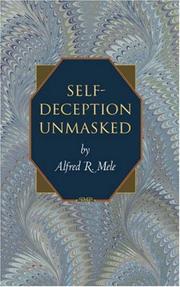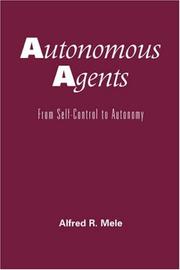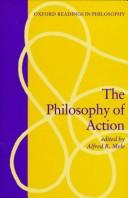
ISBN: 1283316897 9786613316899 1400823978 1400814464 9781400814466 9781400823970 0691057443 9780691057446 0691057451 9780691057453 Year: 2001 Publisher: Princeton, N.J. Princeton University Press
Abstract | Keywords | Export | Availability | Bookmark
 Loading...
Loading...Choose an application
- Reference Manager
- EndNote
- RefWorks (Direct export to RefWorks)
Self-deception raises complex questions about the nature of belief and the structure of the human mind. In this book, Alfred Mele addresses four of the most critical of these questions: What is it to deceive oneself? How do we deceive ourselves? Why do we deceive ourselves? Is self-deception really possible? Drawing on cutting-edge empirical research on everyday reasoning and biases, Mele takes issue with commonplace attempts to equate the processes of self-deception with those of stereotypical interpersonal deception. Such attempts, he demonstrates, are fundamentally misguided, particularly in the assumption that self-deception is intentional. In their place, Mele proposes a compelling, empirically informed account of the motivational causes of biased beliefs. At the heart of this theory is an appreciation of how emotion and motivation may, without our knowing it, bias our assessment of evidence for beliefs. Highlighting motivation and emotion, Mele develops a pair of approaches for explaining the two forms of self-deception: the "straight" form, in which we believe what we want to be true, and the "twisted" form, in which we believe what we wish to be false. Underlying Mele's work is an abiding interest in understanding and explaining the behavior of real human beings. The result is a comprehensive, elegant, empirically grounded theory of everyday self-deception that should engage philosophers and social scientists alike.
Self-deception. --- Deception --- Defense mechanisms (Psychology) --- Self-perception --- Self-deception --- Deception. --- Chicanery --- Deceit --- Subterfuge --- Truthfulness and falsehood --- Intrigue
Book
ISBN: 9780197574232 Year: 2022 Publisher: Oxford Oxford university press
Abstract | Keywords | Export | Availability | Bookmark
 Loading...
Loading...Choose an application
- Reference Manager
- EndNote
- RefWorks (Direct export to RefWorks)
What did you do a moment ago? What will you do after you read this? Are you deciding as we speak, or is something else going on in your brain or elsewhere in your body that is determining your actions? Stopping to think this way can freeze us in our tracks. A lot in the world feels far beyond our control--the last thing we need is to question whether we make our own choices in the way we usually assume we do. Questions about free will are so major and consequential that we may prefer not to think about them at all, lest we feel completely lost and unsure of everything we thought we knew! Free Will: An Opinionated Guide offers a clear and straightforward introduction to this vexing topic. Drawing on decades of extensive research in philosophy, neuroscience, and psychology, internationally recognized authority on free will Alfred R. Mele explains and explores the most prominent theories, puzzles, and arguments in free will, all the while presenting his own distinctive take on the topic. like determinism, neuroscience, and control."--
Book
ISBN: 0199371628 9780199371624 Year: 2014 Publisher: Oxford: Oxford university press,
Abstract | Keywords | Export | Availability | Bookmark
 Loading...
Loading...Choose an application
- Reference Manager
- EndNote
- RefWorks (Direct export to RefWorks)
Does free will exist? The question has fueled heated debates spanning from philosophy to psychology and religion. The answer has major implications, and the stakes are high. To put it in the simple terms that have come to dominate these debates, if we are free to make our own decisions, we are accountable for what we do, and if we aren't free, we're off the hook.There are neuroscientists who claim that our decisions are made unconsciously and are therefore outside of our control and social psychologists who argue that myriad imperceptible factors influence even our minor decisions to the extent that there is no room for free will. According to philosopher Alfred R. Mele, what they point to as hard and fast evidence that free will cannot exist actually leaves much room for doubt. If we look more closely at the major experiments that free will deniers cite, we can see large gaps where the light of possibility shines through. In Free: Why Science Hasn't Disproved Free Will, Mele lays out his opponents' experiments simply and clearly, and proceeds to debunk their supposed findings, one by one, explaining how the experiments don't provide the solid evidence for which they have been touted. There is powerful evidence that conscious decisions play an important role in our lives, and knowledge about situational influences can allow people to respond to those influences rationally rather than with blind obedience.Mele also explores the meaning and ramifications of free will. What, exactly, does it mean to have free will -- is it a state of our soul, or an undefinable openness to alternative decisions? Is it something natural and practical that is closely tied to moral responsibility? Since evidence suggests that denying the existence of free will actually encourages bad behavior, we have a duty to give it a fair chance.
Book
Year: 2009 Publisher: Tallahasee (Fla.): Florida State university. Department of philosophy,
Abstract | Keywords | Export | Availability | Bookmark
 Loading...
Loading...Choose an application
- Reference Manager
- EndNote
- RefWorks (Direct export to RefWorks)
Book
ISBN: 9780199329298 019932929X Year: 2013 Publisher: Oxford: Oxford university press,
Abstract | Keywords | Export | Availability | Bookmark
 Loading...
Loading...Choose an application
- Reference Manager
- EndNote
- RefWorks (Direct export to RefWorks)
In A Dialogue on Free Will and Science, renowned philosopher Alfred Mele explores the experiments in neuroscience and psychology that have been said to pose the greatest challenges to free will. He uses an imagined dialogue among several characters to make what is typically a complex topic more accessible and engaging for students. Guided by the question "How much power do these scientific challenges have?", the characters first consider what having free will means and then react to well-known experiments that question its existence, including work by Libet and Milgram and the bystander, dime, and Stanford prison experiments. Their discussions show how useful philosophical methods can be in assessing and interpreting scientific findings, thereby revealing certain weaknesses in these scientific challenges.Ideal for courses in free will, introduction to philosophy, ethics, philosophy of mind, and philosophy of science, A Dialogue on Free Will and Science encourages students to form their own opinions on the validity and strength of the major scientific challenges to free will.

ISBN: 0195150430 Year: 2001 Publisher: Oxford : Oxford university press,
Abstract | Keywords | Export | Availability | Bookmark
 Loading...
Loading...Choose an application
- Reference Manager
- EndNote
- RefWorks (Direct export to RefWorks)
Book
ISBN: 0190659971 019065998X 0190659998 0190660007 Year: 2017 Publisher: Oxford University Press
Abstract | Keywords | Export | Availability | Bookmark
 Loading...
Loading...Choose an application
- Reference Manager
- EndNote
- RefWorks (Direct export to RefWorks)
Book
ISBN: 0197500943 0197500951 019750096X 0197500978 Year: 2020 Publisher: Oxford University Press USA - OSO
Abstract | Keywords | Export | Availability | Bookmark
 Loading...
Loading...Choose an application
- Reference Manager
- EndNote
- RefWorks (Direct export to RefWorks)

ISBN: 0198751745 Year: 1997 Publisher: Oxford Oxford University Press
Abstract | Keywords | Export | Availability | Bookmark
 Loading...
Loading...Choose an application
- Reference Manager
- EndNote
- RefWorks (Direct export to RefWorks)
Book
ISBN: 9780199333950 Year: 2015 Publisher: New York, N.Y. Oxford University Press
Abstract | Keywords | Export | Availability | Bookmark
 Loading...
Loading...Choose an application
- Reference Manager
- EndNote
- RefWorks (Direct export to RefWorks)
Philosophical anthropology --- Developmental psychology --- Social psychology

 Search
Search Feedback
Feedback About
About Help
Help News
News